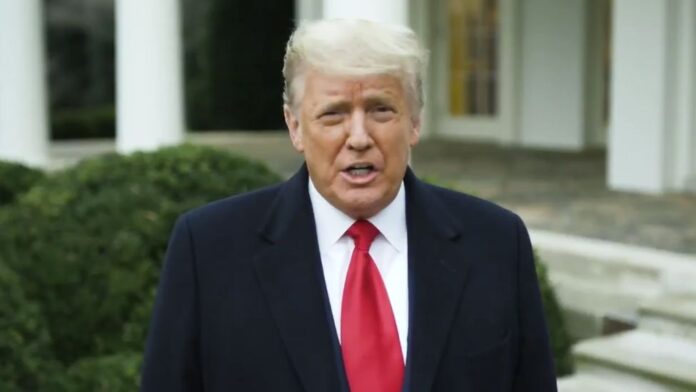
Donald Trump has become the first president in US history to be impeached twice, after being charged with “incitement of insurrection” over last week’s deadly storming of Congress.
The House of Representatives accused Mr Trump of encouraging violence with his false claims of election fraud.
He now faces trial in the upper chamber, the Senate, but not before he leaves office next Wednesday.
Senators can vote to bar him from ever holding public office again.
In a video released after the vote in the House, Mr Trump called on his followers to remain peaceful, without mentioning his impeachment.
“Violence and vandalism have no place in our country… No true supporter of mine would ever endorse political violence,” he said, striking a sombre and conciliatory tone.
The FBI has warned of possible armed protests planned for Washington DC and all 50 US state capitals in the days before Joe Biden, a Democrat, is inaugurated as the new US president.
What was Trump charged with?
Impeachment charges are political, not criminal. The president was accused by the House of inciting the storming of the Capitol with a speech on 6 January to supporters outside the White House.
He urged them to “peacefully and patriotically” make their voices heard, but also to “fight like hell” against an election that he falsely told them had been stolen.
Following Mr Trump’s remarks, his supporters broke into the Capitol, forcing lawmakers to suspend certification of election results and take shelter. The building was placed on lockdown and five people died in the melee.
The article of impeachment stated that Mr Trump “repeatedly issued false statements asserting that the presidential election results were fraudulent and should not be accepted”.
It says he then repeated these claims and “wilfully made statements to the crowd that encouraged and foreseeably resulted in lawless action at the Capitol”, leading to the violence and loss of life.
“President Trump gravely endangered the security of the United States and its institutions of government, threatened the integrity of the democratic system, interfered with the peaceful transition of power, and imperilled a coequal branch of government.”
Last week, 139 Republicans voted against accepting the result of the 2020 election and Mr Trump’s defeat.
What happens next?
The impeachment article will head to the Senate, which will hold a trial to determine the president’s guilt. A two-thirds majority is needed to convict Mr Trump, meaning at least 17 Republicans would have to vote with Democrats in the evenly split, 100-seat upper chamber.
As many as 20 Senate Republicans are open to convicting the president, the New York Times reported on Tuesday.
If Mr Trump is convicted by the Senate, lawmakers could hold another vote to block him from running for elected office again – which he has indicated he planned to do in 2024.
But the trial will not come during Mr Trump’s remaining week in office.
Republican Senate leader Mitch McConnell said in a statement: “Given the rules, procedures, and Senate precedents that govern presidential impeachment trials, there is simply no chance that a fair or serious trial could conclude before President-elect Biden is sworn in next week.”
He said it would best serve the interests of the nation if Congress focused on a safe and orderly transition of power for the incoming Biden administration.
Mr McConnell also said in a note to colleagues that he had not made a final decision on how he would vote.
Mindful that his first days in office could become mired in the impeachment drama, Mr Biden said he hoped senators would not neglect the “other urgent business of this nation”, such as approving his cabinet nominees, coronavirus relief and the nationwide vaccination programme.
However, a Republican congresswoman, Marjorie Taylor Greene of Georgia, announced she would file articles of impeachment against Mr Biden, accusing him of abuse of power, the day after his inauguration.
No US president has ever been removed from office through impeachment. Mr Trump was impeached by the House in 2019 over his dealings in Ukraine, but acquitted by the Senate. So was Bill Clinton in 1998 and Andrew Johnson in 1868.
BBC



